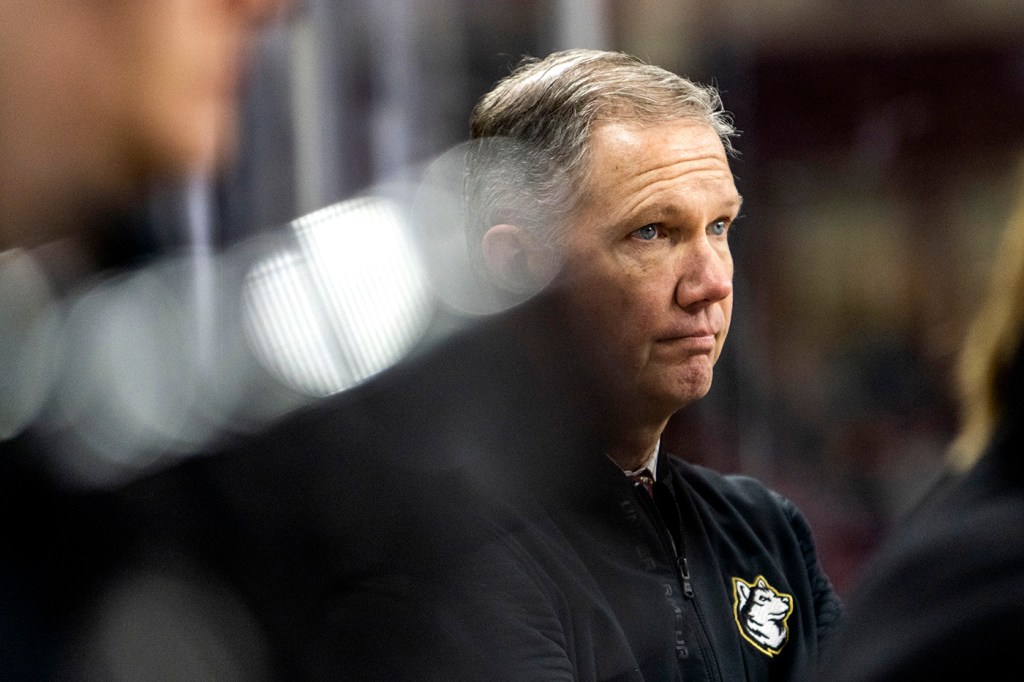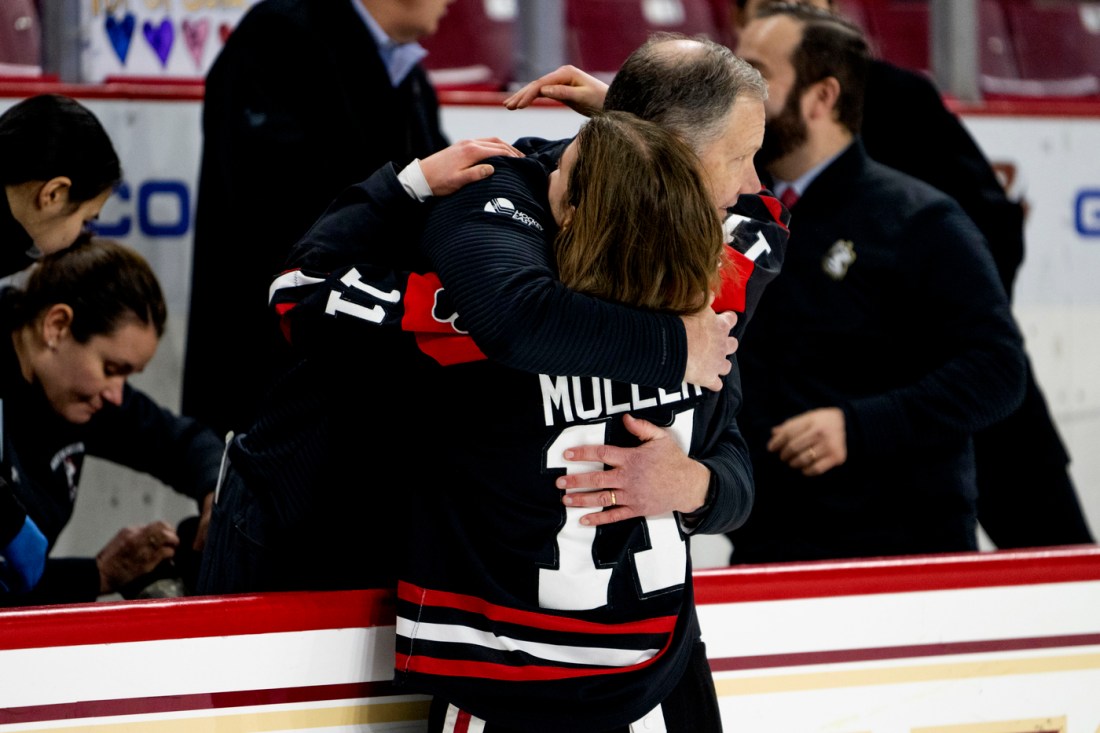How coach Dave Flint quietly built the Northeastern women’s hockey program into a perennial national title contender

The long journey resumes with an NCAA quarterfinal at 3 p.m. Saturday at fourth-seeded Yale. A victory there will advance fifth-seeded Northeastern to the Frozen Four of the NCAA Women’s Ice Hockey Championship for a third straight year, placing the Huskies within reach of Northeastern’s first NCAA title in any team sport.
“It’s really hard to get to that level—to the pinnacle,” says Dave Flint, on the cusp of his greatest achievement in 14 seasons as the Northeastern women’s hockey coach. “So now we’re here after all these years—all the hard work, all the past players—and you can taste it. That’s what drives our team every day.”
The Huskies (33-2-1) reached the national final in 2021, losing on an unusual goal in overtime. Last year they were knocked out in double-overtime of the national semifinal. Now they take on Yale (28-3-1) with the momentum of a 21-game winning streak, the best defense in Division 1 and the top-scoring line in college hockey.
The level of excellence may seem routine to fans of the Huskies, who have gone 86-9-4 over the past three years. For Flint it’s the culmination of a long-term investment that began with his arrival at Northeastern in 2008.

“When Dave took over, the program was not in a great spot, and he went about it in a very balanced way because he wanted to build sustained success,” says Jim Madigan, Northeastern’s athletic director and former men’s hockey coach. “People will look at you going to the Frozen Four and they’ll think it’s automatic. But there’s a lot of hard work that’s going in that locker room and arena for them to get there. And I don’t take it for granted.”
Flint, who had spent the previous four years launching a championship women’s program at Saint Anselm College in New Hampshire, recognized the need for patience at Northeastern. His initial teams were built around Swiss goalie Florence Schelling, who turned into a star.
“I knew we weren’t going to get the blue-chip kids right away, so we had to recruit character first,” says Flint, who stepped away for the 2009-10 season to help coach the U.S. women’s hockey team that won a silver medal at the Olympics. “We tried to get captains of teams and leaders and good students and good citizens that were also good hockey players. They might not be that five-star recruit that everybody’s trying to get. But I felt if we could build a nucleus with really good kids, we could start to slowly climb that ladder.”
Flint established his approach to recruiting and coaching in general while landing Kendall Coyne Schofield, arguably the best American player of all time, who in 2016 would earn the Patty Kazmaier Memorial Award as the nation’s top player.
“I told her, ‘You’re the top recruit in the country. I want you here more than anything. But I’m not going to be the guy that calls you once a week. I’m not emailing you. I’m not writing you letters. Because you’ve got enough on your plate,’” Flint recalls. “I said, ‘I’ll check in with you once in a while, I’ll go to your games.’”
But he wasn’t going to pressure her.
“‘I’m giving you your space,’” Flint says he told Coyne Schofield. “‘I want you at Northeastern’—and I tell all recruits this—‘because you’re passionate about Northeastern and you know this is where you want to be and it’s the right place for you.’”
So low-key was Flint’s ensuing recruitment of Alina Mueller that she wound up committing to Northeastern via email.
“He’s the best coach I’ve had in my career,” says Mueller, a three-time Olympian with Switzerland and five-time Patty Kazmaier finalist who recently passed Coyne Schofield as Northeastern’s all-time leading scorer. “We built a really good relationship. I can talk to him about everything. He always wants to make us as people better, he looks out for everyone, and he’s a great hockey coach too. I’m forever thankful for him and I will definitely stay in touch with him once I leave here.”
Coyne led Northeastern to its first NCAA women’s hockey tournament appearance in 2016. Two years later, the Huskies began their ongoing streak of a half-dozen Hockey East championships.
Aerin Frankel, the 2021 Patty Kazmaier recipient and two-time NCAA goaltender of the year, has been replaced by long-time understudy Gwyneth Philips, who is favored to win the national goalie award this year. Skylar Fontaine has moved on after making the past four All-American teams—and yet the defense has improved statistically without her and team captain Brooke Hobson this season.
The Huskies’ front-line trio—Mueller (58 points), Maureen Murphy (53) and Chloé Aurard (52)—ranks among the nation’s top 10 scorers and has combined for 663 points over their college careers. A Northeastern-record eight Huskies made Hockey East All-Star teams this season, doubling the number of any other school.
“There will be times in practice when things aren’t going well and the captains will call everybody in and say, ‘Hey, listen, we need to pick it up’ or ‘We need to start focusing,’” says Flint, recently named Hockey East coach of the year for the fourth time in five seasons. “A big part of our culture and success is holding each other accountable, which is a challenge for kids nowadays. Nobody wants to be the bad guy. Nobody wants to be perceived like she’s being a jerk. But for the most part they respond and they understand that we’re all striving for a common goal here.”
As the expectations have risen, Flint has exercised more control over his emotions.
“I used to [yell] a little more when I was younger,” says Flint, who is married with two children. “Now I just raise my voice, and I don’t do it often. There are times when I don’t think they’re going to respond well to me getting upset—times when they need a little more encouragement. It’s always delicate as a coach knowing when to get on them and when not to.”
Flint, a former goalie who was team MVP at North Adams State College as a senior, made the switch to coaching women’s hockey when he started the Saint Anselm program from scratch in 2004. Peers warned that a door would shut behind him—that he would have a hard time moving back to men’s hockey.
“There probably were a lot of [men’s] coaches that would think it was beneath them,” says Flint, who had assisted the men’s team at Saint Anselm for seven years. “I looked at it like, ‘I want to be a [head] coach and it doesn’t matter to me.’ I just wanted athletes that want to work hard and want to be successful.”
Other coaches told Flint that women players were just as competitive and ambitious as men. The big difference, they said, was that the women were better listeners.
Flint has also found that women are more inclined to share the puck.
“Guys will shoot before they pass,” Flint says. “Women will pass before they shoot. There have been so many times when Alina and Chloé have come off the ice and I’m like, ‘Why didn’t you shoot that?’ They were trying to make that extra pass when they both shoot the puck so well.”
His players credit Flint with knowing how to help them find the best within themselves.
“He keeps everything not too high, not too low when he’s speaking to us,” says senior defender Megan Carter, who has won the NCAA Elite 90 awards as the player with the highest grade-point average at the past two Frozen Fours. “When he comes in between periods, he’s always positive and tells us exactly what we need to do. He just wants the energy to be positive and that’s what fuels our team.”
“He’s very good at keeping it calm,” adds Mueller. “Sometimes he picks his spots to speak louder in the locker room—and if he’s speaking louder, we know we did something not well. But he never does it in public. He keeps everybody together.”
Mueller finds herself wanting to win the national title for her coach.
“He deserves it,” she says. “He’s just a great human with a great family and he takes care of us.”
Ian Thomsen is a Northeastern Global News reporter. Email him at i.thomsen@northeastern.edu. Follow him on Twitter @IanatNU.






